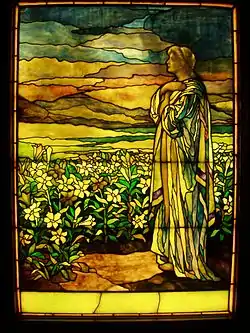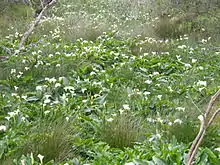The Birds of Heaven
The Birds of Heaven (also referred to as The Flowers of the Field or The Lilies of the Field) is a discourse given by Jesus as recorded in the Gospels of Matthew and Luke in the New Testament. The discourse makes several references to the natural world: ravens (in Luke), lilies and moths are all mentioned.

From Matthew 6:25–33 (King James Version "KJV"):
6:25 Therefore I say unto you, Take no thought for your life, what ye shall eat, or what ye shall drink; nor yet for your body, what ye shall put on. Is not the life more than meat, and the body than raiment?
6:26 Behold the fowls of the air: for they sow not, neither do they reap, nor gather into barns; yet your heavenly Father feedeth them. Are ye not much better than they?
6:27 Which of you by taking thought can add one cubit unto his stature?
6:28 And why take ye thought for raiment? Consider the lilies of the field, how they grow; they toil not, neither do they spin:
6:29 And yet I say unto you, That even Solomon in all his glory was not arrayed like one of these.
6:30 Wherefore, if God so clothe the grass of the field, which to day is, and to morrow is cast into the oven, shall he not much more clothe you, O ye of little faith?
6:31 Therefore take no thought, saying, What shall we eat? or, What shall we drink? or, Wherewithal shall we be clothed?
6:32 (For after all these things do the Gentiles seek:) for your heavenly Father knoweth that ye have need of all these things.
6:33 But seek ye first the kingdom of God, and his righteousness;and all these things shall be added unto you.

From Luke 12:22–32 (KJV):
12:22 And he said unto his disciples, Therefore I say unto you, Take no thought for your life, what ye shall eat; neither for the body, what ye shall put on.
12:23 The life is more than meat, and the body is more than raiment.
12:24 Consider the ravens: for they neither sow nor reap; which neither have storehouse nor barn; and God feedeth them: how much more are ye better than the fowls?
12:25 And which of you with taking thought can add to his stature one cubit?
12:26 If ye then be not able to do that thing which is least, why take ye thought for the rest?
12:27 Consider the lilies how they grow: they toil not, they spin not; and yet I say unto you, that Solomon in all his glory was not arrayed like one of these.
12:28 If then God so clothe the grass, which is to day in the field, and to morrow is cast into the oven; how much more will he clothe you, O ye of little faith?
12:29 And seek not ye what ye shall eat, or what ye shall drink, neither be ye of doubtful mind.
12:30 For all these things do the nations of the world seek after: and your Father knoweth that ye have need of these things.
12:31 But rather seek ye the kingdom of God; and all these things shall be added unto you.
12:32 Fear not, little flock; for it is your Father's good pleasureto give you the kingdom.
The New King James Version incorporates Luke 12:33–34 within the same section:
Sell what you have and give alms; provide yourselves money bags which do not grow old, a treasure in the heavens that does not fail, where no thief approaches nor moth destroys. For where your treasure is, there your heart will be also.
Commentary
St. Augustine says that this parable should be taken at face value and not allegorized. Its meaning is clearly stated:
- ...seek ye [first] the kingdom of God, and his righteousness; and all these things shall be added unto you.[1]
Danish philosopher Søren Kierkegaard (1813-1855) often referred to Matthew 6:26. For him the birds of the air and the lilies of the field represented instructors in "religious joy", an appreciation that "there is a today". For him learning joy was to learn to let go of tomorrow, not in the sense of failing to plan or provide, but in giving one's attention to the tasks of today without knowing what they will have meant.[2]
Worldly worry always seeks to lead a human being into the small-minded unrest of comparisons, away from the lofty calmness of simple thoughts. ... Should not the invitation to learn from the lilies be welcome to everyone ... As the ingenuity and busyness increase, there come to be more and more in each generation who slavishly work a whole lifetime far down in the low underground regions of comparisons. Indeed, just as miners never see the light of day, so these unhappy people never come to see the light: those uplifting, simple thoughts, those first thoughts about how glorious it is to be a human being.[3]
M. Conrad Myers sees in the reference to Solomon "and all his glory" a subtle echo of Ecclesiastes 2:11 "But when I turned to all the works that my hands had wrought, and to the toil at which I had taken such pains, behold! all was vanity and a chase after wind, with nothing gained under the sun."[4]
While various attempts have been made to identify the specific type of flower,[5] G.E. Post suggests "lily" is here meant to include a wide assortment of wild flowers.[6]
References
- Jeffrey, David L., "The Lilies of the Field", A Dictionary of Biblical Tradition in English Literature, Wm. B. Eerdmans Publishing, 1992 ISBN 9780802836342
- Corrigan, John. The Oxford Handbook of Religion and Emotion, Oxford Handbooks Online, 2008 ISBN 9780195170214
- Kierkegaard, Søren. Upbuilding Discourses in Various Spirits, 1847
- Hyer, M. Conrad. The Meaning of Creation: Genesis and Modern Science", Westminster John Knox Press, 1984 ISBN 9780804201254
- Carpenter, William. Scripture Natural History, Lincoln, Edmands & Company, 1833
- Post, G.E. "Lily", A Dictionary of the Bible, Vol. III, (James Hastings, ed.), The Minerva Group, Inc., 2004 ISBN 9781410217264
Further reading
- Kierkegaard, Søren. "The Lily in the Field and the Bird in the Air" in Hong, Howard Vincent and Hong, Edna Hatlestad. Without Authority, Princeton University Press, 1997 ISBN 9780691012391
The Birds of Heaven | ||
| Preceded by The Lord's Prayer in the Sermon on the Mount |
New Testament Events |
Succeeded by Discourse on Judging in the Sermon on the Mount |